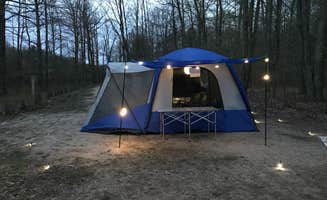Dispersed camping near Rose City, Michigan provides outdoor experiences within the Huron-Manistee National Forest region where elevation changes range from 700 to 1,200 feet, creating diverse terrain unusual for Michigan's Lower Peninsula. This area features numerous unmarked camping spots along forest roads and near water bodies, accessible via two-track roads that often require vehicles with adequate clearance. Camping options span from completely undeveloped sites to rustic state forest campgrounds with minimal amenities.
What to do
Backpacking loops: The North Country Trail and Manistee River Trail create a popular 20-mile loop for backpackers and day hikers. "Hiked five days, four nights. Connects to NCT. Bring toilet paper. Water in stream is probably safe but bring a filter or enough water to last. No campgrounds, but there are areas with clearings for camping," notes a visitor to Huron-Manistee National Forest.
Water activities: The region's numerous lakes and rivers provide excellent opportunities for swimming, fishing, and paddling. "We just had to stay, and I am so excited to go back in the fall. I know this says no pets but we were able to bring our dog and saw many other dogs enjoying the park as well," shares one camper about their impromptu riverside camping experience.
Horseback riding: Several designated areas accommodate equestrian camping and trail riding. A visitor to Goose Creek Trail Camp reports, "I camp here with my horse - there are plenty of trails and there is river access with big stairs leading down to the nice footed river - it was my young horses first time being in the water and the stairs made it easier for him."
What campers like
Privacy between sites: Campers consistently mention the spaciousness and separation between camping areas in the forest. "Quiet, spacious sites spaced far apart in a wooded area. Four different loops divided the whole camp into regions. Signage got us to the beach easily," explains a visitor describing their experience at Huron-Manistee National Forest.
Wildlife encounters: The area offers abundant wildlife viewing opportunities, particularly in less developed areas. At De Cheau Lake Camping, one camper noted their site "Feels more remote than it really is. Lots of room for multiple vehicles/sites. Very near a handful of private residences. Can hear the state route from the site but it was low volume traffic. Beautiful lake, blessed by the Elk bugles nearby."
Trail maintenance: The well-maintained trail system receives consistent praise from hikers and backpackers. "I have dispersed camped here twice now and each time is such a pleasure, the trails are always so maintained, the sites are easy to find and always marked. Defiantly one of my favorites," shares a regular visitor to the backcountry areas.
What you should know
Permits and passes: Michigan Recreation Passports are required at many sites, including some dispersed areas. A camper at De Cheau Lake noted: "Posted on Southern entrance: Michigan Rec Passport Required."
Navigation challenges: GPS systems are essential as cell service is minimal throughout the forest. "This is a vast area in which there are many campground sites with some opportunities for dispersed camping. Use a GPS system or a program to ensure you are not in private property. Have at least 3 sites as possibilities," advises a visitor to the region.
Facilities limitations: Most dispersed camping locations have no amenities. "Bring a garden trowel and toilet paper. There are streams with decent drinking water but I would recommend a filter anyways," suggests a backpacker who spent 5 days exploring the Cut River Dispersed Campsite area and surrounding trails.
Tips for camping with families
Beginner backpacking: The varied terrain provides excellent introductory backpacking opportunities for children. "The campground itself was very nice...it was our starting point for our family hiking/backpacking/camping trip this year. We had 11 Grandkids with us, and we had 9 backpacking tents. The children all carried their own tents, sleeping bags, and food for 4 days," shares a family group leader.
Water safety: Rivers and lakes offer swimming areas, but currents can be unpredictable. "The River trail supplied us with our water needs for cooking and drinking, from the Manistee River. It was a fun trip for all," notes a grandparent who took multiple children on a backpacking trip.
Educational opportunities: The diverse ecosystem provides chances to teach children about forest ecology and wildlife. "Lots of wildlife and great views. You need to carry everything out that you carry in," mentions a camper who appreciates the learning experiences available in the natural setting.
Tips from RVers
Site accessibility: Large rigs should verify access before attempting to reach dispersed sites. "Super rustic and right on the river!" notes a camper, highlighting the primitive nature of many riverside camping spots that may challenge larger vehicles.
Limited hookups: RVers should prepare for dry camping with no services at most locations. At Goose Creek Trail Camp, each site includes "its own fire pit and picnic table" but has no hookups or dump stations, requiring self-contained camping capabilities.
Seasonal road conditions: Spring and fall camping requires attention to road conditions, as many access routes become muddy and difficult after rain. "We keep our Jeep ready for camping at any moment and places like this are why we do it," explains a visitor, underscoring the advantage of high-clearance vehicles when accessing remote camping locations.


